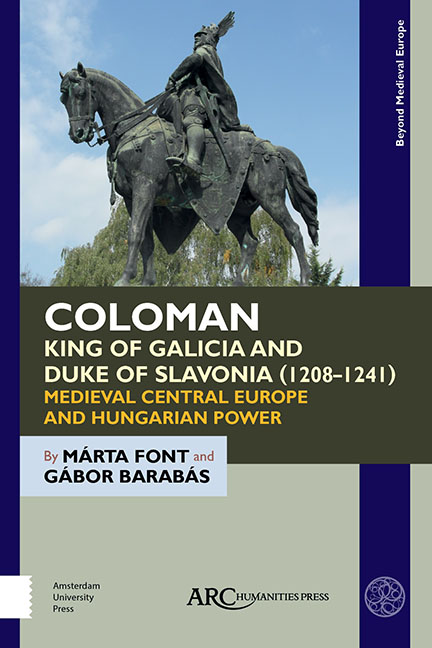 Coloman, King of Galicia and Duke of Slavonia (1208–1241)
Coloman, King of Galicia and Duke of Slavonia (1208–1241) Book contents
- Frontmatter
- Contents
- List of Illustrations
- Foreword
- Introduction
- PART ONE COLOMAN AS CHILD RULER OF GALICIA
- Chapter 1 The Galician Context in 1205
- Chapter 2 The Agreement of Scepus
- Chapter 3 Coloman’s Coronation as King of Galicia: Date and Place
- Chapter 4 The Hungarian Elite and Coloman’s Court
- Chapter 5 Coloman’s Position in Halych, 1215–22: Campaigns and Opponents
- Chapter 6 Upholding the Galician Claim: Coloman’s Place in Hungary
- PART TWO COLOMAN, DUKE OF WHOLE SLAVONIA (1226–1241)
- Chapter 7 Coloman and Scepus, Before 1226
- Chapter 8 Coloman as Duke of Whole Slavonia from 1226
- Chapter 9 Coloman’s Status and the Inner Workings of the Duchy
- Chapter 10 Coloman’s Ecclesiastical and Secular Actitivities in Slavonia
- Chapter 11 Coloman’s Rule in Slavonia
- Chapter 12 Politics and Dynastic Affairs
- Chapter 13 Challenges in the Balkans
- Chapter 14 The Mongol Attack and Coloman’s Death
- Conclusion: Coloman in the Eyes of Posterity
- Bibliography
- Index
Chapter 14 - The Mongol Attack and Coloman’s Death
Published online by Cambridge University Press: 20 November 2020
- Frontmatter
- Contents
- List of Illustrations
- Foreword
- Introduction
- PART ONE COLOMAN AS CHILD RULER OF GALICIA
- Chapter 1 The Galician Context in 1205
- Chapter 2 The Agreement of Scepus
- Chapter 3 Coloman’s Coronation as King of Galicia: Date and Place
- Chapter 4 The Hungarian Elite and Coloman’s Court
- Chapter 5 Coloman’s Position in Halych, 1215–22: Campaigns and Opponents
- Chapter 6 Upholding the Galician Claim: Coloman’s Place in Hungary
- PART TWO COLOMAN, DUKE OF WHOLE SLAVONIA (1226–1241)
- Chapter 7 Coloman and Scepus, Before 1226
- Chapter 8 Coloman as Duke of Whole Slavonia from 1226
- Chapter 9 Coloman’s Status and the Inner Workings of the Duchy
- Chapter 10 Coloman’s Ecclesiastical and Secular Actitivities in Slavonia
- Chapter 11 Coloman’s Rule in Slavonia
- Chapter 12 Politics and Dynastic Affairs
- Chapter 13 Challenges in the Balkans
- Chapter 14 The Mongol Attack and Coloman’s Death
- Conclusion: Coloman in the Eyes of Posterity
- Bibliography
- Index
Summary
COLOMAN, AND HIS brother King Béla IV, faced a new menace in 1241, bigger than any other previous threat, the Mongol invasion. They could not ignore it, as they had done in the case of the help requested for the Latin Empire.
The Mongol Invasion and the Papal Reaction
Not only did Coloman start making military provisions for an attack by the nomadic Mongols, but he informed the pope about the situation, perhaps before his brother but after the catastrophe of the battle of Muhi in April 1241. The pope's response for the request for help was the last letter Gregory IX ever sent Coloman. The Hungarian Kingdom received no practical help in its moment of great need, as Béla IV later complained to Pope Innocent IV. Belatedly, Coloman was granted the protection of the Apostolic See and warriors who fought the Mongols were given an indulgence, as was the case for crusaders. Béla was given the same, while the prelates in Hungary were instructed to censure the enemies of the king.
The Glorious Last Battle at Muhi
Coloman maintained loyalty to his brother even in the shadow of the Mongol menace and joined his troops to those of the royal army, marching fatefully forward. We are fortunate to have not one but two contemporary sources reporting the events of 1241 in detail. One was Roger of Apulia, who served as the chaplain of cardinal-legate Jacob of Pecorari in 1232, and later received several ecclesiastical benefices. He lived through the Mongol attack as archdeacon of Várad/Nagyvárad (Oradea), was captured by the nomads, but eventually managed to escape. Roger wrote his Carmen miserabile, or Epistle to the Sorrowful Lament upon the Destruction of the Kingdom of Hungary by the Tatars, of his experiences and the general state of the Hungarian kingdom from the 1230s to 1243–44 and dedicated it to Cardinal Jacob Pecorari. No medieval manuscript of the work is extant and is known from Johannes de Thurocz, who edited it as a supplement of his Chronicle published in Brno in 1488. The other source has already featured several times concerning Coloman's life.
- Type
- Chapter
- Information
- Coloman, King of Galicia and Duke of Slavonia (1208–1241)Medieval Central Europe and Hungarian Power, pp. 121 - 126Publisher: Amsterdam University PressPrint publication year: 2019


